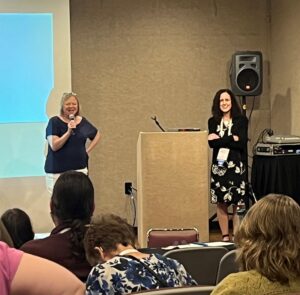
(Right) Leah Thomas, Ph.D., a theologian and associate professor of Pastoral Care, director of Contextual Education at Anabaptist Mennonite Biblical Seminary, and biblical scholar Stephanie Day Powell, assistant professor of Hebrew Bible at Eastern Mennonite University (left)
On the afternoon of July 10, during a seminar entitled “Restitutio Divina: Embodied Biblical Reflection”, Leah Thomas, Ph.D., a theologian and associate professor of Pastoral Care, director of Contextual Education at Anabaptist Mennonite Biblical Seminary, and biblical scholar Stephanie Day Powell, assistant professor of Hebrew Bible at Eastern Mennonite University, led participants through a guided, meditative exercise called restitutio divina.
Restitutio divina is a Latin-originating word and is an embodied practice of biblical reflection that blends lectio divina, visio divina, Somatic Experiencing, and Inner Relationship Focusing. This contemplative workshop invited participants to engage in scripture and art through sensation, emotion and image, creating space for healing and deeper connection with the sacred. Participants were welcomed into a dynamic, restorative encounter with God’s Word through their whole selves — mind, body and spirit.
Thomas and Day Powell spoke on the importance of connecting with our bodies as a spiritual practice and encouraged participants to return to resources like breathwork and grounding exercises if strong feelings arose. Because some of us may have experienced challenging feelings around scripture and the Bible, it is important to be attuned to what our bodies may be carrying, either consciously or even subconsciously.
Leah Thomas said, “Our bodies are always communicating with us, whether or not we are fully aware of it. Sometimes we listen, but often we don’t because the body doesn’t speak in words.” She continued, “Instead, it speaks through sensations, our posture, changes in temperature, our heart rate, our breath.”
After the exercise concluded, the presenters asked participants to gently return to the room, while also encountering whatever emotions, thoughts or feelings they experienced with compassion, noticing and not judging the body or mind. Thomas and Day Powell then encouraged participants to explore where they felt sensations or what thoughts they had during the experience, contemplating their origins but holding themselves loosely and with grace. As the session concluded, Thomas and Day Powell asked a few reflective questions for participants to consider and offered further conversations after the seminar.
By Christle Hain.

